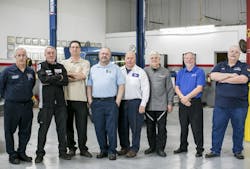“I’m just one shop—what kind of change could I possibly make as one shop?”
Ken Quasney completely understands that attitude. Between managing staff, tracking KPIs, improving processes, paying the bills, and everything that comes with owning an independent repair shop ... how would one shop owner have time to fight legislative issues affecting automotive repair? To leverage better deals from parts suppliers? To make his or her single voice heard in a sea of thousands upon thousands of small businesses looking to enact change?
“Most people don’t think they have a voice in any of this—but you do,” says Quasney, owner of Auto Sense Auto Repair & Tire Center in Millersville, Md. “These people will listen if you come at them with strength. It can’t be one person. It has to be a larger group—a group that is a force to be reckoned with.”
That “force” Quasney is referring to is the Council of Automotive Repair (CAR), a sister organization to the Washington, Maryland, Delaware Service Station and Automotive Repair Association (WMDA), which, in just eight years, has grown from seven founding members to over 500 independent repair shops in Maryland and Delaware using their collective influence to oppose legislative change affecting their businesses and to secure competitive deals with suppliers.
The best part? Quasney says shops anywhere in the country can do this. By banding as a group, CAR is proving that shop owners can control the future of the industry, and that change can indeed be made through strength in numbers.
“Our mission statement is to make the independent repair shop the overwhelming choice of auto repairs for the driving public,” he says. “And we hope owners throughout the nation will follow suit.”
Buying Power
From working his way from the prep department to service director at a shop in 1974, to opening his own two-bay gas station in 1989, to building his current six-bay, 6,000-square-foot shop in 1999, Quasney has always believed in advancing not only his own business, but the independent repair shop industry as a whole.
In fact, back in 2008, six other Maryland shop owners felt the same way: Billy Hillmuth (Hillmuth Certified Automotive with four locations in Maryland), Stephen Powell (Thoroughbred Auto Care in Laurel), Frank Eberle (Eberle Automotive in Severn), Clyde McLaughlin (Chesapeake Import Services in Annapolis), Walt Eger (Walt Eger’s Service Center in Severn), and Lewis Schnauble (Schnauble Automotive in Westminster).
Since WMDA heavily focused on service stations, they decided it would be beneficial to start a similar group focused on auto care.
Working Out a Deal
Chris Day, director of lubricant sales for PPC Lubricants, worked with Ken Quasney in establishing the rebate deal that now reaches over 500 shops. What really sold the company, he says, was CAR’s well-crafted “win-win proposal.”
A Win for PPC/Castrol
Quasney laid out how CAR’s projected growth would lead to an increased customer base for PPC and Castrol, and compensate for the rebates offered to shops.
A Win for CAR
Day says that by laying out how much shops will save through a deal with PPC, Quasney not only showed how the deal would attract more customers, but also proved that CAR was an organization that cares about its members.
“First and foremost, CAR is about benefiting shops,” Day says. “More than any organization we work with, CAR proves that and that aligns with our core values as a company.”
“Your buying power is really limited to how many people you have working for you in your shop,” Quasney says. “So we decided to start pulling together.”
Endorsed Programs
In January 2015, Quasney posed for a photo holding a giant check from PPC Lubricants and Castrol. Paid to the order of all CAR members was $382,823, representing the amount in rebates 500-plus shops received collectively throughout 2014. On average, that’s roughly $765 per year per shop. The high-production shops reap the benefits of the PPC/Castrol deal even more, accumulating yearly savings in the thousands (Quasney claims he saves $1,300 per quarter on oil).
And the PPC/Castrol partnership is just the tip of the iceberg. It represents one of 14 companies CAR has established endorsed programs with to save money on various business essentials, such as auto parts (Parts Authority), website design and management (Net Driven), insurance matters (Aflac and Meadowbrook Insurance Group), electricity (Sprague Operating Resources), and credit card processing (First Merchant Services).
Quasney and his six partners were looking to save money on costly business expenses that every shop owner experiences, and setting up the PPC/Castrol deal was the first and most crucial step toward building the CAR membership base: The more shops that join CAR, the more money it spends altogether, giving the organization more power in leveraging deals with businesses and allowing the independent shops to compete with MSOs and dealerships.
“In the past, they couldn’t have cared less about us individually because we didn’t represent a big share of their market,” Quasney says. “But now they’re interested because national programs are throwing them under the bus and we’re offering better deals.”
As membership has increased over the past eight years, CAR’s endorsed program network has grown as well, adding more and more savings each year. In total, Quasney says a typical CAR member saves thousands of dollars each year by paying a yearly membership fee of $249.
Greg Dressel, owner of Auto Tech Car Care Inc. in Bowie, Md., says he saves around $5,000 per year on parts alone, and that his total savings range in the tens of thousands.
“It helps make you a little more competitive,” he says. “My costs have been about 3 to 10 percent lower than deals I made individually.”
“That’s what CAR is all about: getting the issues every shop faces straightened out, and working together on a plan to save everyone money,” Quasney says.
Strength in Numbers
One of the advantages of bringing together many small businesses is the collective legislative influence they form. “It’s all about strength in numbers,” says McCauley, director of government affairs for CAR, and the organization is living proof that no voice is too small to be heard when it’s backed by a large, influential powerhouse.
Making Legislative Change
Kirk McCauley spends a lot of time on House floors, fighting issues CAR members decided would affect their businesses. Here, he lists some tips for making a difference legislatively in your area:
Participation
Nothing is more influential than showing up at a bill hearing with several shops. The more businesses you can show being affected, the better.
Show The Facts
When a bill proposing businesses provide an employee one hour of paid sick leave for every 30 hours worked, McCauley reported to legislators how much that would cost an average independent repair shop.
“It’s easy to think one hour for every 30 isn’t a big deal,” he says. “But if you show them that adds up to 56 hours per year, and then multiply that by 10 employees, they get a better picture of what their decision would cost an average business.”
Tell A Story
The power of storytelling plays a huge role in convincing a legislator, McCauley says.
“Most of them don’t have any idea how small businesses operate,” he says. “Find a way to show them how the legislation is affecting the human side of the business.”
Join the “Making Legislative Change” thread on Ratchet+Wrench’s LinkedIn page at ratchetandwrench.com/linkedin to discuss how you’re working with your legislature to help the auto repair industry.
One of the main motivations for starting CAR, Quasney says, was that shops could hyper-focus on legislative issues important to Maryland and Delaware shops that larger automotive repair organizations might give less attention to.
Of the over 60 bills CAR fought against in Maryland alone, 52 were eventually defeated in the House. McCauley travels to bill hearings, most of the time accompanied by several CAR members, in an effort to prove how detrimental to business certain bills can be.
CAR also partners with the Service Station Dealers of America and Allied Trades (SSDA-AT), a national alliance comprised of associations representing service station dealers and repair facilities, in contacting federal regulators and sending press releases to media outlets, telling stories and stating statistical information gathered from CAR shops.
From fighting rising estate taxes to minimum wage increases to measurement standards for biodiesel, Quasney says there’s no issue too large for CAR to tackle. At monthly meetings held in various areas throughout Maryland and Delaware, CAR members discuss which legislative issues they’ll fight, brainstorm gameplans for the public hearings, and decide who will attend those hearings.
“Anything that affects repair shops and small businesses that we feel is really going to impact us, we’ll go down and fight it,” he says. “If we don’t fight, we’ll get walked over. We have to take an active role.”
The Next Step
In its effort to improve the independent repair industry, CAR is now employing its unified influence to tackle one gaping issue: the technician shortage.
CAR encourages its members to take advantage of the relief provided through endorsed programs by helping aspiring technicians pay for schooling.
Also, shop owners can sell the comprehensive training opportunities available through CAR: Businesses involved in the endorsed programs network go on to support nine training events hosted by CAR throughout the year, providing discounted training to member shops. The classes are chosen by CAR members, who discuss the most pressing training needs at monthly meetings.
“Where else do you go where you provide your own tools and training and schooling and still work against the clock every day?” Quasney asks. “By overcoming these issues, we can attract young people back into the trade.”
Start Your Own Auto Repair Organization
Growing an automotive repair organization in your region to the size of CAR isn’t easy, but Quasney says there are basic steps everyone should take:
Outline your goals: When Quasney and his partners set out to create CAR, they first outlined what they wanted to achieve, which resulted in its mission statement: “Provide training, services and a legislative voice to the independent auto repair industry in Washington, D.C., Maryland and Delaware.”
Partner with a trade organization. By partnering with WMDA, CAR instantly had access to hundreds of service stations, many of which had automotive repair segments.
“Whether it’s partnering with body work, a towing association, gasoline—anything that has an infrastructure behind it, you could piggyback on them, and they’ll bring in members and revenue.”
Establish an endorsed program. Proving you can save a shop any bit of money through an endorsed program will go far in your pitch.
Gather testimonials. Show that your organization is actually helping other shops.
Reach out to shops. Quasney says CAR initially had to seek out many of its members. Board members would network with current members and peruse websites find the best shops across both states.

